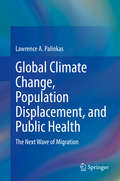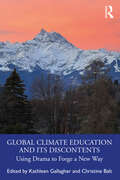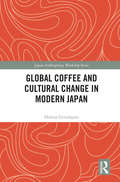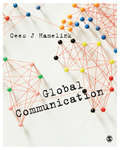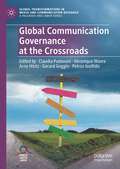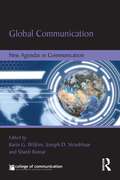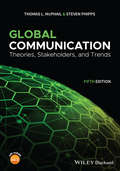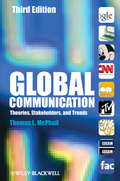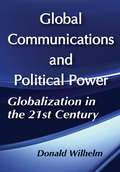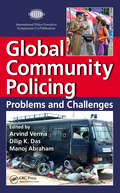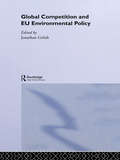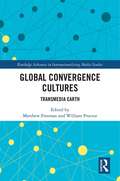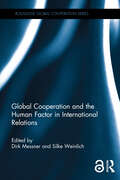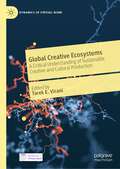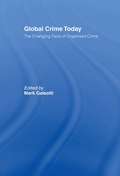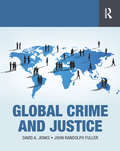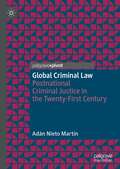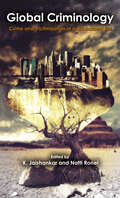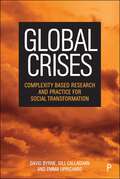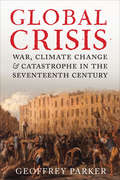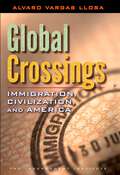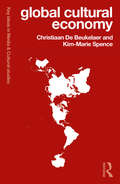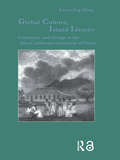- Table View
- List View
Global Climate Change, Population Displacement, and Public Health: The Next Wave of Migration
by Lawrence A. PalinkasThis timely text examines the causes and consequences of population displacement related to climate change in the recent past, the present, and the near future. First and foremost, this book includes an examination of patterns of population displacement that have occurred or are currently underway. Second, the book introduces a three-tier framework for both understanding and responding to the public health impacts of climate-related population displacement. It illustrates the interrelations between impacts on the larger physical and social environment that precipitates and results from population displacement and the social and health impacts of climate-related migration. Third, the book contains first-hand accounts of climate-related population displacement and its consequences, in addition to reviews of demographic data and reviews of existing literature on the subject. Topics explored among the chapters include: Hurricane Katrina and New Orleans Hurricane Maria and Puerto Rico The California Wildfires Fleeing Drought: The Great Migration to Europe Fleeing Flooding: Asia and the Pacific Fleeing Coastal Erosion: Kivalina and Isle de Jean Charles Although the book is largely written from the perspective of a researcher, it reflects the perspectives of practitioners and policymakers on the need for developing policies, programs, and interventions to address the growing numbers of individuals, families, and communities that have been displaced as a result of short- and long-term environmental disasters. Global Climate Change, Population Displacement, and Public Health is a vital resource for an international audience of researchers, practitioners, and policymakers representing a variety of disciplines, including public health, public policy, social work, urban development, climate and environmental science, engineering, and medicine.
Global Climate Education and Its Discontents: Using Drama to Forge a New Way
by Kathleen Gallagher Christine BaltThis innovative and practical book offers pedagogical tools to show how drama can be used in educational settings to advance a relational, action-oriented, interdisciplinary, and creative climate education attuned to the social and emotional effects of the climate emergency. Based on a six-year ethnographic research study taking place with teachers, artists, community leaders, and young people globally, and taking its lead from the following provocation – can performance become a site for new imaginaries for socio-ecological justice? – the book explores the unique conceptual and pedagogical ‘discontents’ of climate education across geographically and culturally distinct sites of learning. It also examines how artful engagement through drama pedagogies can open up more collective, critical, and hopeful forms of thinking and being.The book is divided into two sections. The first part of the book, Local engagements and encounters, consists of chapters that conduct an in-depth appraisal of the local artistic work from each site, examining how matters of socio-ecological justice are given fresh urgency and complexity through the application of performance as pedagogy. The second part of the book, Pedagogical and artistic innovations, offers substantive praxis chapters on the drama-based pedagogical methods employed in the research. In these chapters, the world-building capacities of theatre-making offer up new, performative pedagogical orientations to the climate emergency beyond those of critique.Global Climate Education and Its Discontents: Using Drama to Forge a New Way is valuable reading for scholars interested in the ontological and epistemological dimensions of the climate emergency, especially within and across the following fields: drama, theatre and performance studies, applied theatre and drama education, educational research, and children/childhood and youth studies. The book also invites a readership of teachers and teacher-educators who are interested in applying drama pedagogies in the classroom to explore matters of socio-ecological justice and the climate crisis.
Global Coffee and Cultural Change in Modern Japan (Japan Anthropology Workshop Series)
by Helena GrinshpunThis book explores the impact in Japan of the rise of global coffee chains and the associated coffee culture. Based on extensive original research, the book discusses the cultural context of Japan, where tea-drinking has been culturally important, reports on the emergence of the new coffee shop consumer experience, and reflects on the link between consumption and identity, on cultural fantasies about modern, Western, or global lifestyles, on the effects of global standardization, and on much more.
Global Communication
by Cees Hamelink"Comprehensive in its scope and scale, rigorously argued and richly illustrated with wide-ranging examples, this clearly written and user-friendly book from a veteran commentator on international communication will be valuable for students and scholars. Strongly recommended." - Daya Thussu, Professor of International Communication, University of Westminster Global Communication explores the history, present and future of global communication, introducing and explaining the theories, stories and flows of information and media that affect us all. Based on his experience teaching generations of students to critically examine the world of communication around them, Cees Hamelink helps readers understand the thinkers, concepts and questions in this changing landscape. This book: Explores the cultural, economic, political and social dimensions and consequences of global communication Introduces the key thinkers who have been inspirational to the field Teaches you to master the art of asking critical questions Takes you through concrete cases from UN summits to hot lines and cyber-surveillance Boosts your essay skills with a guided tour of the literature, including helpful comments and recommendations of what to cite Brings you directly into the classroom with a series of video lectures This book guides students through the complex terrain of global communication, helping you become a critically informed participant in the ever-changing communication landscape. It is essential reading for students of communication and media studies.
Global Communication Governance at the Crossroads (Global Transformations in Media and Communication Research - A Palgrave and IAMCR Series)
by Petros Iosifidis Gerard Goggin Arne Hintz Claudia Padovani Véronique WavreThis edited volume addresses current challenges, trends and transformations in global communication governance. Exploring changes in the actors, issues, values and contexts of media and communications, it investigates the crossroads that media policy is facing and offers visions for the future. A diverse range of scholars and expert practitioners discuss what regulatory reforms and governing mechanisms are required to advance democratic participation and fundamental rights in platform societies.Organized around five sections, the volume considers the geopolitics of emerging communication orders; the changing roles of actors and stakeholders; the challenge of embedding rights and values in regulatory arrangements; the intersection of technology and policy; and the need to rethink epistemologies and methodologies for researching this field.Contributions from different disciplines and cultural backgrounds include provocative think pieces and longer analyses. All chapters are grounded in historically-aware understandings of contemporary transformations, while anticipating dynamics of our communication futures.
Global Communication: New Agendas in Communication (New Agendas in Communication Series)
by Shanti Kumar Joseph D. Straubhaar Karin G. WilkinsThis volume interrogates what "global" means in the context of "communication," and who benefits from global communication practices and industries. Emerging scholars contribute their unique perspectives in communication scholarship, charting innovative directions for research that connects empirical evidence with pressing questions of social significance. This critical reflection leads to considering problems that result from the way global communication becomes mobilized, in the practice of journalism and development as well as the ICT industry. Global Communication defines the term "globalization," through understanding the cultural geography of global, regional, national, and local media. Critical evaluations of media production, distribution, and consumption practices, within cultural contexts, offer insights into how people "mediate" the global. Chapters draw attention to communications in Latin America, the Arab World, and South Asia, complicating territorial boundaries and exploring how local audience and industry practices work within global as well as local configurations.
Global Communication: Theories, Stakeholders, and Trends
by Thomas L. McPhail Steven PhippsDiscusses the players, theories, and trends that affect how the world communicates and gets their information This book is a definitive text on multinational communication and media conglomerates, exploring how global media influences both audiences and policy makers around the world. Comprehensively updated to reflect the many fast moving developments associated with this dynamic field, this new edition investigates who and where certain cultural products are coming from and why, and addresses issues and concerns about their impact all over the world. Global Communication: Theories, Stakeholders, and Trends, 5th Edition has been thoroughly updated with new content, trends, and conclusions, all based on the latest data. The book examines broadcasting, mass media, and news services ranging from MSNBC, MTV, and CNN to television sitcoms and Hollywood export markets. It investigates the roles of the major players, such as News Corp, Sony, the BBC, Disney, Bertelsmann, Viacom, and Time Warner, and probes the role of advertising and the Internet and their ability to transcend national boundaries and beliefs. New chapters look at the growing importance and significance of other major regions such as the media in the Middle East, Europe, and Asia. • Outlines the major institutions, individuals, corporations, technologies, and issues that are altering the international information, telecommunication, and broadcasting order • Focuses on a broad range of issues, including social media and new services like Netflix, as well as Arab and Asian media • Includes major updates on discussion of the Internet to incorporate global events over the last few years (such as Russian use thereof, Facebook, Google) • Looks at how streaming services such as Netflix, Amazon, Spotify, and more have emerged as dominant players in world entertainment • Offers an updated instructor’s website with an instructor’s manual, test banks, and student activities Global Communication: Theories, Stakeholders, and Trends, 5th Edition is intended as an upper-level, undergraduate text for students in courses on International/Global Communication, Global Media/Journalism, and Media Systems in Journalism, Communications, or Media Studies Departments.
Global Communication: Theories, Stakeholders, and Trends
by Thomas L. McPhailGlobal Communication is the most definitive text on multi-national communication and media conglomerates, exploring how global media, particularly CNN, the BBC, Euronews, and Al Jazeera, influence audiences and policy makers alike. Includes four completely new chapters on Asian media, Euromedia, the Middle East, and public diplomacy from a post 9/11 perspective Updates the story of arab media with a section on "Arab Media and the Al Jazeera Effect" by Middle East-based expert Lawrence Pintak Covers the global war on terrorism and the substantial US investment in Iraqi media Provides updated accounts and overviews of the largest and most important media corporations from around the world, from MTV and CNN to Bollywood Incorporates discussions of Hulu, YouTube, Myspace, and the Twitter phenomenon as well as new stakeholders in global online media
Global Communications and Political Power
by Donald WilhelmFirst published in 1990. Routledge is an imprint of Taylor & Francis.
Global Community Policing: Problems and Challenges
by Arvind Verma, Dilip K. Das and Manoj AbrahamIn nations all over the world, community policing has been found extremely beneficial in improving public confidence in the police. Community-oriented policing and police-citizen cooperation is now the accepted framework for all progressive police departments. Drawn from the proceedings at the 2010 International Police Executive Symposium (IPES) in
Global Competition and EU Environmental Policy (Routledge/eui Studies In Environmental Policy Ser.)
by Jonathan GolubGlobal Competition and EU Environmental Policy is the first book to examine the relationship between economic competitiveness and environmental protection in European Union policy.A wide range of international case studies addresses key agreements and policies, including those dealing with ozone layer protection, pesticide exports, shipping climate
Global Convergence Cultures: Transmedia Earth (Routledge Advances in Internationalizing Media Studies)
by William Proctor Matthew FreemanToday’s convergent media industries readily produce stories that span multiple media, telling the tales of superheroes across comics, film and television, inviting audiences to participate in the popular universes across cinema, novels, the Web, and more. This transmedia phenomenon may be a common strategy in Hollywood’s blockbuster fiction factory, tied up with digital marketing and fictional world-building, but transmediality is so much more than global movie franchises. Different cultures around the world are now making new and often far less commercial uses of transmediality, applying this phenomenon to the needs and structures of a nation and re-thinking it in the form of cultural, political and heritage projects. This book offers an exploration of these national and cultural systems of transmediality around the world, showing how national cultures – including politics, people, heritage, traditions, leisure and so on – are informing transmediality in different countries. The book spans four continents and twelve countries, looking across the UK, Spain, Portugal, France, Estonia, USA, Canada, Colombia, Brazil, Japan, India, and Russia.
Global Cooperation and the Human Factor in International Relations (Routledge Global Cooperation Series)
by Silke Weinlich Dirk MessnerThis book aims to pave the way for a new interdisciplinary approach to global cooperation research. It does so by bringing in disciplines whose insights about human behaviour might provide a crucial yet hitherto neglected foundation for understanding how and under which conditions global cooperation can succeed. As the first profoundly interdisciplinary book dealing with global cooperation, it provides the state of the art on human cooperation in selected disciplines (evolutionary anthropology and biology, decision-sciences, social psychology, complex system sciences), written by leading experts. The book argues that scholars in the field of global governance should know and could learn from what other disciplines tell us about the capabilities and limits of humans to cooperate. This new knowledge will generate food for thought and cause creative disturbances, allowing us a different interpretation of the obstacles to cooperation observed in world politics today. It also offers first accounts of interdisciplinary global cooperation research, for instance by exploring the possibilities and consequences of global we-identities, by describing the basic cooperation mechanism that are valid across disciplines, or by bringing an evolutionary perspective to diplomacy. This book will be of great interest to scholars and postgraduates in International Relations, Global Governance and International Development.
Global Cooperation and the Human Factor in International Relations (Routledge Global Cooperation Series)
by Dirk Messner and Silke WeinlichThis book aims to pave the way for a new interdisciplinary approach to global cooperation research. It does so by bringing in disciplines whose insights about human behaviour might provide a crucial yet hitherto neglected foundation for understanding how and under which conditions global cooperation can succeed.As the first profoundly interdisciplinary book dealing with global cooperation, it provides the state of the art on human cooperation in selected disciplines (evolutionary anthropology and biology, decision-sciences, social psychology, complex system sciences), written by leading experts. The book argues that scholars in the field of global governance should know and could learn from what other disciplines tell us about the capabilities and limits of humans to cooperate. This new knowledge will generate food for thought and cause creative disturbances, allowing us a different interpretation of the obstacles to cooperation observed in world politics today. It also offers first accounts of interdisciplinary global cooperation research, for instance by exploring the possibilities and consequences of global we-identities, by describing the basic cooperation mechanism that are valid across disciplines, or by bringing an evolutionary perspective to diplomacy.This book will be of great interest to scholars and postgraduates in International Relations, Global Governance and International Development.
Global Creative Ecosystems: A Critical Understanding of Sustainable Creative and Cultural Production (Dynamics of Virtual Work)
by Tarek E. ViraniThis book reorients the lens of global creative economies in order to focus on ecological articulations of cultural production ecosystems. While numerous volumes and studies exist of how cities and regions all over the world produce culture, this volume uses a creative ecosystems perspective to articulate and underpin examples of sustainable growth and development with respect to cultural production.This volume offer a distinctive, in-depth understanding of how creative and cultural policy works in cities from around the world – not solely from academic or policy perspectives but including practitioners as well. The book aims to question and reformulate policy as it has been developed through creative industries approaches and instead offer up different examples and approaches to regional development with a focus on cultural production. The book carves a creative economy policy-oriented path of development that reflects the real world.
Global Crime Today: The Changing Face of Organised Crime
by Mark GaleottiCrime is recognized as a constant factor within human society, but in the twenty-first century organized crime is emerging as one of the distinctive security threats of the new world order. The more complex, organized and interconnected society becomes, its crime becomes too. This book recognizes that the new century will be defined in part by a struggle between an ‘upperworld’, defined by increasingly open economic systems and democratic politics, and a transnational, entrepreneurial, dynamic and richly varied underworld, willing and able to use and distort these trends for its own ends. In order to understand this challenge, this book gathers together experts from a variety of fields to understand how organized crime is changing. From the Sicilian Mafia and the Japanese Yakuza, to the new challenges of Russian and East European gangs and the ‘virtual mafias’ of the cybercriminals, this book offers a clear and concise introduction to many of the key players moving in this global criminal underworld. This book is a special issue of Global Crime
Global Crime and Justice
by John Randolph Fuller David A. JenksGlobal Crime and Justice offers a truly transnational examination of both deviance and social controls around the world. Unlike comparative textbooks detailing the criminal justice systems of a few select nations, or cataloging types of international crimes that span multiple legal jurisdictions, Global Crime and Justice provides a critical and integrated investigation into the nature of crime and how different societies react to it. The book first details various types of international crime, including genocide, war crimes, international drug and weapons smuggling, terrorism, slavery, and human trafficking. The second half covers international law, international crime control, the use of martial law, and the challenges of balancing public order with human and civil rights. Global Crime and Justice is suitable for use in criminology and criminal justice departments, as well as in political science, international relations, and global studies programs. It will appeal to all who seek an academically rigorous and comprehensive treatment of the international and transnational issues of crime and social order.
Global Criminal Law: Postnational Criminal Justice in the Twenty-First Century
by Adán Nieto MartínThis book explores the emergence of an ius puniendi outside state criminal law and beyond international criminal law. The study connects with the reflections that have been made for some years in global law studies, showing how this trend also has a clear manifestation in the field of criminal law. The analysis begins by mapping out the different manifestations of this new global criminal regulation. This includes very diverse areas, ranging from judicial cooperation to the problems involved in the application of criminal sanctions in failed states, or investigations carried out on the internet. New sanctioning systems are also studied, such as the debarment regime of the World Bank or the sanctions in the hands of international sports federations. It is a question of discovering all criminal law – understood in a broad sense – that lies outside the confines of the state.
Global Criminology: Crime and Victimization in a Globalized Era
by K. Jaishankar Natti RonelGlobal criminology is an emerging field covering international and transnational crimes that have not traditionally been the focus of mainstream criminology or criminal justice. Global Criminology: Crime and Victimization in a Globalized Era is a collection of rigorously peer-reviewed papers presented at the First International Conference of the So
Global Crises: Complexity Based Research and Practice for Social Transformation
by David Byrne Gill Callaghan Emma UprichardIn today’s world, there are interwoven crises affecting us at every level. This book explores the impact of these crises on applied social research. It shows how using a complexity framework in research is key to tackling global challenges effectively. By featuring illustrative examples from the UK, China, Brazil, South Africa and the US, the authors demonstrate how an action research programme based around the use of existing social research methods embedded in processes of co-production and participation can drive real-time social change. In doing so, the book highlights the transformative role of action-oriented research in addressing today's complex global challenges.
Global Crisis: War, Climate Change, & Catastrophe in the Seventeenth Century
by Geoffrey ParkerThe acclaimed historian demonstrates a link between climate change and social unrest across the globe during the mid-17th century.Revolutions, droughts, famines, invasions, wars, regicides, government collapses—the calamities of the mid-seventeenth century were unprecedented in both frequency and severity. The effects of what historians call the "General Crisis" extended from England to Japan and from the Russian Empire to sub-Saharan Africa and the Americas.In this meticulously researched volume, historian Geoffrey Parker presents the firsthand testimony of men and women who experienced the many political, economic, and social crises that occurred between 1618 to the late 1680s. He also incorporates the scientific evidence of climate change during this period into the narrative, offering a strikingly new understanding of the General Crisis. Changes in weather patterns, especially longer winters and cooler and wetter summers, disrupted growing seasons and destroyed harvests. This in turn brought hunger, malnutrition, and disease; and as material conditions worsened, wars, rebellions, and revolutions rocked the world.
Global Critical Race Feminism
by Adrien Katherine WingGlobal Critical Race Feminism is the first anthology to focus explicitly on the legal rights of women of color around the world. Containing nearly thirty essays, the book addresses such topical themes as responses to white feminism; the flashpoint issue of female genital mutilation; the intersections of international law with U.S. law; "Third World" women in the "First World;" violence against women; and the global workplace. Broadly representative, the reader addresses the role and status-legal and otherwise-of women in such countries as Cuba, New Zealand, France, Serbia, Nicaragua, Colombia, South Africa, Japan, China, Australia, Ghana, and many others. Authors include: Aziza al-Hibri, Penelope Andrews, Taimie Bryant, Devon Carbado, Mai Chen, Brenda Cossman, Lisa Crooms, Mary Dudziak, Isabelle Gunning, Anna Han, Berta Hernández, Laura Ho, Sharon Hom, Rosemary King, Kiyoko Knapp, Hope Lewis, Martha Morgan, Zorica Mrsevic, Vasuki Nesiah, Leslye Obiora, Gaby Oré-Aguilar, Catherine Powell, Jenny Rivera, Celina Romany, Judy Scales-Trent, Antoinette Sedillo Lopez, J. Clay Smith, and Leti Volpp.
Global Crossings: Immigration, Civilization, and America
by Alvaro Vargas LlosaImmigration still elicits fear and mistrust, and not just on the part of the &“receiving&” society despite having occurred for thousands of years throughout human history. Communities from which people migrate often disapprove of the migrants&’ decision and consider it treacherous. The recent reawakening of the debate about immigration in the new millennium has evoked intense emotion particularly in the United States and Europe.Global Crossings cuts through the jungle of myth, falsehood and misrepresentation that dominates the debate, clarifying the causes and consequences of human migration. Why do millions of people continue to risk their lives, and oftentimes lose them, in the pursuit of a chance to establish themselves in a foreign land? The book first looks at the immigrant experience, which connects the present to the past, and America to the rest of the world, and explores who migrants are and why they move. The conduct of migrants today is no different than that of migrants in the past. And contrary to the claims by immigration critics, the patterns of contemporary migration do not differ fundamentally from those of other epochs. Global Crossings then discusses immigration regarding culture. To what degree are foreigners culturally different? Can natives adapt? Can immigrants assimilate into the new society? In assessing whether critics are justified in pointing to a major cultural shift Alvaro Vargas Llosa reviews such topics as religion, education, entrepreneurial spirit, and attitudes toward the receiving society. The book then analyzes such economic factors as jobs, wages, education, and the welfare state. How can an economy continue to operate even in the face of major legal obstacles, and how have recessions and times of prosperity influenced—more significantly than government efforts—the number of immigrants coming into the United States and other countries? Vargas Llosa finds that immigration&’s contributions to an economy far outweigh the costs. Finally Global Crossings makes a call for open minds and provides a pro-immigration agenda for reform. The erosion of national boundaries—and even the idea of the nation state—is already underway as people become ever more inter-connected across borders. This process will make immigration a defining force in the arena of competitive globalization and the people of those countries who embrace immigration will enjoy more prosperous, peaceful, and freer lives in the emerging world.
Global Cultural Economy (Key Ideas in Media & Cultural Studies)
by Christiaan De Beukelaer Kim-Marie SpenceGlobal Cultural Economy critically interrogates the role cultural and creative industries play in societies. By locating these industries in their broader cultural and economic contexts, Christiaan De Beukelaer and Kim-Marie Spence combine their repertoires of empirical work across four continents to define the ‘cultural economy’ as the system of production, distribution, and consumption of cultural goods and services, as well as the cultural, economic, social, and political contexts in which it operates. Each chapter introduces and discusses a different theme, such as inclusion, diversity, sustainability, and ownership, highlighting the tensions around them to elicit an active engagement with possible and provisional solutions. The themes are explored through case studies including Bollywood, Ghanaian music, the Korean Wave, Jamaican Reggae, and the UN Creative Economy Reports. Written with students, researchers, and policy-makers in mind, Global Cultural Economy is ideal for anyone interested in the creative and cultural industries, media and cultural studies, cultural policy, and development studies.
Global Culture, Island Identity: Continuing Change (Studies In Anthropology And History Ser. #Vol. 8)
by Karen Fog OlwigLooking at the development of cultural identity in the global context, this text uses the approach of historical anthropology. It examines the way in which the West Indian Community of Nevis, has, since the 1600s, incorporated both African and European cultural elements into the framework of social life, to create an Afro-Caribbean culture that was distinctive and yet geographically unbounded - a "global culture". The book takes as its point of departure the processes of cultural interaction and reflectivity. It argues that the study of cultural continuity should be guided by the notion of cultural complexity involving the continuous constitution, development and assertion of culture. It emphasizes the interplay between local and global cultures, and examines the importance of cultural display for peoples who have experienced the process of socioeconomic marginalization in the Western world.
